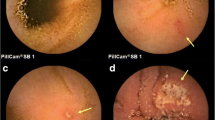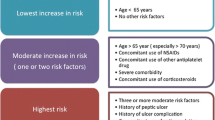Abstract
Aspirin and nonsteroidal antiinflammatory drugs (NSAIDs) damage the gastroduodenal epithelium by two mechanisms: direct toxic effects and effects related to the depletion of endogenous prostaglandins. The prostaglandin-depleted mucosa has increased suceptibility to luminal aggressive factors, yet the role of acid in the pathogenesis of the NSAID ulcer is controversial. In humans, standard doses of H2-receptor antagonists prevent only duodenal injury and provide no protection for the gastric mucosa. It is not known whether more potent suppression of acid can prevent NSAID damage. Twenty healthy volunteers were randomized to a double-blind, placebo-controlled, crossover study to determine if omeprazole, 40 mg/day prevents gastroduodenal injury due to two weeks of aspirin administration (650 mg four times a day). The severity of mucosal injury was quantitated by endoscopy and stratified by a scale from 0 (normal) to 4 (ulcer). Fourteen of the 20 subjects had less gastric injury during cotherapy with omeprazole. All six with no difference received aspirin plus omeprazole in the first treatment period. Omeprazole significantly decreased aspirin-induced gastric mucosal injury (P<0.001, Wilcoxon signed-rank test). Omeprazole protected 85% of subjects from extensive gastric erosions (often associated with evidence of intraluminal bleeding) or ulceration, whereas 70% of the subjects developed aspirin-induced grades 3 and 4 gastric injury on placebo (P<0.01 by X2). No subject taking omeprazole developed duodenal injury of any grade, while 50% taking placebo developed erosions and 15% had ulcer (P<0.001). Medication side effects were mild in the majority of subjects. Heartburn occurred in seven subjects on aspirin and placebo vs one on aspirin and omeprazole (P<0.01). Salicylate levels were 7.39±4.72 mg/dl (535±340 µmol/liter) in the placebo group and 6.95±4.3 mg/dl (503±311 µmol/liter) in the omeprazole group. We conclude that omeprazole, 40 mg/day eliminates duodenal injury and markedly ameliorates gastric injury due to administration of aspirin 2600 mg/day. Omeprazole prophylaxis of NSAID injury deserves further study.
Similar content being viewed by others
References
Baum C, Kennedy DL: Utilization of anti-inflammatory drugs. Arthritis Rheum 28:686–689, 1984
Fries JF, Miller SR, Spitz PW, Williams CA, Hubert HB, Bloch DA: Toward an epidemiology of gastropathy associated with nonsteroidal anti-inflammatory drug use. Gastroenterology 96:647–655, 1989
Soll AH, Weinstein WM, Kurata J, Williams CA, Hubert HB, Bloch DA: Nonsteroidal antiinflammatory drugs and peptic ulcer disease. Ann Intern Med 114:307–319, 1991
Silvoso GR, Ivery KJ, Butt JH, Lockard OO, Holt SD, Sisk C, Baskin WN, Mackercher PA, Hewett J: Incidence of gastric lesions in patients with rheumatic disease of chronic aspirin therapy. Ann Intern Med 91:517–520, 1979
Lockark OO, Ivey KJ, Butt JH, Silvoso GR, Sisk C, Holt S: The prevalence of duodenal lesions in patients with rheumatic disease on chronic aspirin therapy. Gastrointest Endosc 26:5–7, 1980
Armstrong CP, Blower AL: Non-steroidal anti-inflammatory drugs and life threatening complications of peptic ulceration. Gut 28:527–532, 1987
Armstrong CP, Whitelaw S: Death from undiagnosed peptic ulcer complications: A continuing challenge. Br J Surg 75:1112–1114, 1988
Lee M, Aldred K, Lee E, Prince DM, Feldman M: Importance of gastric acid in gastric ulcer formation in rabbits with antibody-induced prostaglandin deficiency. Gastroenterology 103:1467–1474, 1992
Berkowitz JM, Adler SN, Sharp JT, Warner CW: Reduction of aspirin-induced gastroduodenal mucosal damage with ranitidine. J Clin Gastroenterol 8(3):377–380, 1986
Ehsanullah RSB, Page MC, Tildesley G, Wood JR: Prevention of gastroduodenal damage induced by non-steroidal anti-inflammatory drugs: Controlled trial of ranitidine. BMJ 297:1017–1021, 1988
Daneshmend TK, Stein AG, Bhaskar NK, Hawkey CJ: Abolition by omeprazole of aspirin induced gastric mucosal injury in man. Gut 31:514–519, 1990
Schoen RT, Vender RJ: Mechanisms of nonsteroidal anti-inflammatory drug-induced gastric damage. Am J Med 86:449–458, 1989
Cohen MM: Mechanisms of injury to gastric mucosa by non-steroidal anti-inflammatory drugs and the protective role of prostaglandin.In Prostaglandins and Leukotrienes in Gastrointestinal Disease. W Domschke, HC Dammann (eds). Berlin, Springer-Verlag, 1988, pp 148–151
Graham DY, Agrawal NM, Roth SH: Prevention of NSAID-induced gastric ulcer with misoprostol: Multicenter, doubleblind, placebo-controlled trial. Lancet 2:1277–1280, 1988
Walan A, Bader JP, Classen M, Lamers CBHW, Piper DW, Rutgersson K, Eriksson S: Effect of omeprazole and ranitidine on ulcer healing and relapse rates in patients with benign gastric ulcer. N Engl J Med 320:69–75, 1989
Laine L, Lanza FL: NSAID-induced gastroduodenal injury: What's the score? Gastroenterology 101:555–557, 1991 (letter)
Graham DY, Smith JL, Dobbs SM: Gastric adaptation occurs with aspirin administration in man. Dig Dis Sci 28:1–6, 1983
Graham DY, Smith JL, Spjut HJ, et al: Gastric adaptation. Gastroenterology 95:327–333, 1988
Brooks PM, Day RO: Nonsteroidal antiinflammatory drugs-differences and similarities. N Engl J Med 324:1716–1725, 1991
Agrawal NM, Roth S, Graham DY, White RH, Germain B, Brown JA, Stromatt SC: Misoprostol compared with sucralfate in the prevention of nonsteroidal anti-inflammatory drug-induced gastric ulcer. Ann Intern Med 115:195–200, 1991
Maton PN: Drug therapy: Omeprazole. N Engl J Med 324:965–975, 1991
Holt S, Howden CW: Omeprazole: Overview and opinion. Dig Dis Sci 36:385–393, 1991
Diaz D, Fabre I, Daujat M, Saint Aubert B, Bories P, Michel H, Maurel P: Omeprazole is an aryl hydrocarbon-like inducer of human hepatic cytochrome P450. Gastroenterology 99:737–747, 1990
McDonnell WM, Scheiman JM, Traber PG: Induction of cytochrome P4501A genes (CYP1A) by omeprazole in the human alimentary tract. Gastroenterology 103:1509–1516, 1992
Andersson T, Bergstrand R, Cederberg C, Eriksson S, Lagerstrom P-O, Skanberg I: Omeprazole treatment does not affect the metabolism of caffeine. Gastroenterology 101:943–947, 1991
Holt S, Zhao-Hua Z, Powers RE: Observations on a proposed measure of genotoxicity in rat gastric mucosa. Gastroenterology 101:650–656, 1991
Fries JF: NSAID gastropathy: The second most deadly rheumatic disease? Epidemiology and risk appraisal. J Rheumatol 18(suppl 28):6–10, 1991
Author information
Authors and Affiliations
Additional information
Supported in part by NIH grant MO1 RR00042 and a gift from Merck Sharpe and Dohme Research Laboratories. The pharmaceutical company had no input into the study design, analysis of results, or review of the manuscript prior to publication.
Rights and permissions
About this article
Cite this article
Scheiman, J.M., Behler, E.M., Loeffler, K.M. et al. Omeprazole ameliorates aspirin-induced gastroduodenal injury. Digest Dis Sci 39, 97–103 (1994). https://doi.org/10.1007/BF02090067
Received:
Revised:
Accepted:
Issue Date:
DOI: https://doi.org/10.1007/BF02090067




